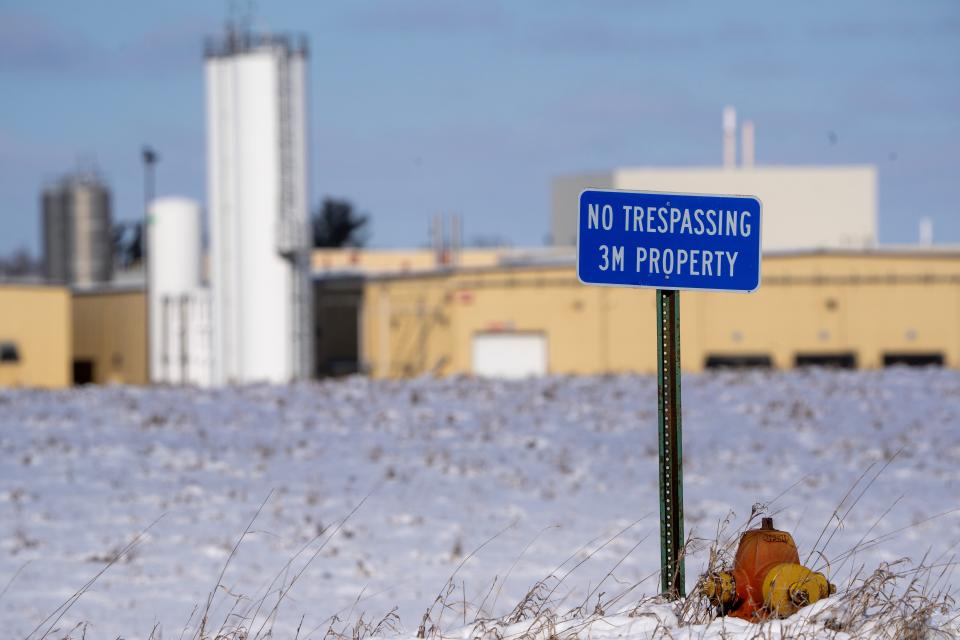'It just makes you wonder': PFAS contamination discovery at Menomonie 3M site raises worries
MENOMONIE – Another community is contending with a contamination of "forever chemicals" in its soil and groundwater, after a release of the chemicals from a nearby 3M manufacturing facility.
The company is investigating the extent of PFAS contamination on its property after a 2022 release of firefighting foam containing the compounds. The chemicals have not yet been detected in the city of Menomonie's drinking water wells, which draw from the groundwater, but that doesn't mean there isn't concern.
Thomas Pearson, a professor at the University of Wisconsin-Stout and the department chair of the social science department, came across a notice of the contamination during a routine search of the state's PFAS contamination database. He wasn't aware of it before this year, he said, and it's unlikely many other residents are either.
While 3M was required to notify the DNR about the contamination on its property, wider public notification wasn't mandated because the contamination hadn't impacted drinking water.

"I want to know, what does it mean? And if they're detecting these chemicals, and monitoring the wells on the site, where is it going to move to?" he said. "And what are the things that we people should be watching for?"
According to documents submitted to the Department of Natural Resources, samples of groundwater and soil at the site contain levels of PFOA as high as 890 parts per trillion, and PFOS as high as 1,800 parts per trillion. State standards are 70 parts per trillion for both compounds in drinking water, either alone or combined. The recommended federal standards for the two compounds are 4 parts per trillion for drinking water. There are no standards for groundwater yet in Wisconsin, and the federal government does not regulate groundwater.
The facility, which employs about 600 people, manufactures goods related to film, tape, coatings, optical and personal care products, according to DNR documents.
The PFAS detected in tests by 3M stem from an unintended release of firefighting foam in 2022 within the facility. Some of the foam was able to make its way out of the building and into nearby grassy areas, necessitating a wider investigation by the company, said Trevor Nobile, a field operations director for the DNR.
"They initiated a cleanup as part of that fire suppression deployment. And that led to subsequent site work where they removed some material, they cleaned up that spill, but then started collecting some samples around their facility," he said. "The initial spill was what really kind of triggered the ongoing PFAS investigation at the facility."
It's unknown if all of the contamination stemmed from that spill, or if it was in the ground and water before then, Nobile said. That will be answered by the investigation, though it's not clear how long that will take.
Documents seem to show that the contamination was found at several different locations on the 3M property, which consists of nearly 500 acres and several buildings not far from Lake Menomin, an impoundment of the Red Cedar River.

Questions remain about whether the contamination could spread farther, and about whether the lake — where people often can be seen fishing — has any level of contamination, since storm water flows in its direction from the 3M facility. There hasn't yet been any testing of the lake, according to the DNR, but in the report submitted to the DNR, water from the site could have unintentionally migrated from the facility.
Chris Zahasky, an assistant professor at the University of Wisconsin-Madison's Department of Geoscience, said the lake and the unnamed tributary that flows into it may be more of a concern than the drinking water, because of how close it is to the 3M facility.
"More than likely what's happening is that PFAS is getting into those tributaries and running into the lake and it's probably a bigger surface water issue," Zahasky said.
Pearson lives only a short distance from the 3M plant; he can see the factory and its smokestacks from his children's bus stop. Sometimes, when he's out for a run at the part behind the factory, he can see foam gathering on Lake Menomin and its unnamed tributary.
While it's not clear if the foam is due to PFAS or something else, he wants the city, which is home to nearly 17,000 people, to seek those answers out and ensure residents are safe and informed.
'We shouldn't assume that just because we don't have information that therefore everything's OK," he said. "I would hope that local officials, DNR officials and 3M are trying to demonstrate that things are safe rather than just assuming it."

When asked about the contamination, 3M acknowledged its investigation but did not respond to additional emailed questions.
"3M, in coordination with the Wisconsin Department of Natural Resources, is developing environmental work plans to address the presence of certain per- and polyfluoroalkyl substances (PFAS) in soil and groundwater at the Menomonie facility through the agency’s Remediation and Redevelopment Program, in which 3M enrolled in 2022," said Grant Thompson, the company's community engagement and public relations senior specialist, said in an email.
To aid in its investigation, 3M has installed seven monitoring wells on its property, and collected samples of both the groundwater and soil. Documents show that further investigation is needed to understand where the PFAS came from, if they may have migrated from another source in the business park, and how far they've spread.
More: High levels of 'forever chemicals' found in well at 3M plant on the outskirts of Wausau
While PFAS — and in particular PFOS — have been detected in both the ground and the water at the site, it hasn't affected Menomonie's municipal water supply. Testing done by the city last year found no PFAS in the drinking water, and the DNR exempted the city from having to do additional testing until next year.
At this point, the city isn't worried, water superintendent Jeremy Hoyt said.
"No concerns with the 3M land," he said in an email. "The state has oversight on that and has done a good job with it."
But Pearson, who has looked at community reaction to PFAS and its impact in places such as Marinette, said there could be more action to get out ahead of the concern that will bloom once more residents are aware of the contamination.
"The report raises so many questions," he said of the documents 3M submitted so far about their findings. "It just makes you wonder."

Wausau 3M plant also struggling with contamination
The Greystone 3M plant, located on the outskirts of Wausau, also had elevated levels of PFAS detected in its drinking water well and is asking employees to not consume water from taps within the building.
It is not clear where the contamination at the 3M location came from, or if it is at all related to the elevated levels of PFAS in Wausau's wells.
Wausau has one of the most extensive PFAS contaminations in the state, with all of its drinking water wells impacted by the chemicals. To combat the issue, the city is working to install a granulated carbon filtration system, which is currently the best way to extract PFAS from water.
3M is also more widely under scrutiny nationwide for its role in manufacturing PFAS and distributing the compounds without warnings to buyers. Earlier this year, the company agreed to pay up to $10.3 billion over a 13-year period to public water suppliers that have detected the substances in drinking water across the nation.
3M is among the world's largest manufacturers of polyfluoroalkyl and perfluoroalkyl substances, or PFAS.
About PFAS
PFAS, or per- and polyfluoroalkyl substances, are a family of man-made chemicals used for their water- and stain-resistant qualities in products like clothing and carpet, nonstick cookware, packaging and firefighting foam.
The family includes 5,000 compounds, which are persistent, remaining both in the environment and human body over time. The chemicals have been linked to types of kidney and testicular cancers, lower birth weights, harm to immune and reproductive systems, altered hormone regulation and altered thyroid hormones.
The chemicals enter the human body largely through drinking water. PFAS have been found across Wisconsin.
Laura Schulte can be reached at leschulte@jrn.com and on X at @SchulteLaura.
This article originally appeared on Milwaukee Journal Sentinel: Discovery of PFAS contamination at Menomonie 3M site raises worries

